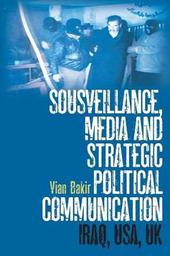
|
Sousveillance, Media and Strategic Political Communication: Iraq, USA, UK
Paperback / softback
Main Details
| Title |
Sousveillance, Media and Strategic Political Communication: Iraq, USA, UK
|
| Authors and Contributors |
By (author) Dr. Vian Bakir
|
| Physical Properties |
| Format:Paperback / softback | | Pages:256 |
|
| Category/Genre | Iraq war |
|---|
| ISBN/Barcode |
9780826430090
|
| Classifications | Dewey:302.23 |
|---|
| Audience | | Professional & Vocational | |
|---|
| Illustrations |
8
|
|
Publishing Details |
| Publisher |
Continuum Publishing Corporation
|
| Imprint |
Continuum Publishing Corporation
|
| Publication Date |
1 May 2010 |
| Publication Country |
United States
|
Description
Fusing perspectives from politics, media studies and cultural studies, Sousveillance, Media and Strategic Political Communication offers insights into impacts on strategic political communication of the emergence of web-based participatory media ('Web 2.0') across the first decade of the 21st century. Countering the control engendered in strategic political communication, Steve Mann's concepts of hierarchical sousveillance (politically motivated watching of the institutional watchers) and personal sousveillance (apolitical, human-centred life-sharing) is applied to Web 2.0. Focusing on interplays of user-generated and mainstream media about, and from, Iraq, detailed case studies explore different levels of control over strategic political communication during key moments, including the start of the 2003 Iraq war, the 2004 Abu Ghraib scandal, and Saddam Hussein's execution in 2006. These are contextualized by overviews of political and media environments from 2001-09. Dr Bakir outlines broader implications of sousveillant web-based participatory media for strategic political communication, exploring issues of agenda-building, control, and the cycle of emergence, resistance and reincorporation of Web 2.0. Sousveillance cultures are explored, delineating issues of anonymity, semi-permanence, instanteneity resistance and social change.
Author Biography
Dr. Vian Bakir is Senior Lecturer in Journalism, in the School of Creative Studies & Media, at Bangor University, UK.
ReviewsThe concept of 'sousveillance' proves to be an intriguingly provocative entry point into a fascinating set of debates. Vian Bakir's inspired critique delves deeply into a wide range of pressing issues at the heart of current innovations in participatory media. --Professor Stuart Allan, Bournemouth University, UK This is a scholarly, well-researched book that casts new light on one of the most important aspects of the media of conflict, the rise of voices from below. Vian Bakir has put together a series of meticulously detailed case studies on how the use of social media changed during the US and UK invasion and occupation of Iraq. By placing individuals' blog entries and digital images against a close reading of the political and media contexts in the west and Iraq, she takes us well beyond a celebration of sousveillance to a critical appreciation of the role of social media in both disrupting and furthering the political control of communication. --Donald Matheson, senior lecturer in media and communication, University of Canterbury, New Zealand A timely and much-needed study on the challenges that participatory media pose to strategic political communication, which offers a novel comparative perspective on Western and Middle Eastern cases as well as original theoretical insights on the social dialectics of power and resistance- surveillance and sousveillance. --Lilie Chouliaraki, Department of Media and Communications, London School of Economics and Political Science Mentioned on the RSA Conference blog. [Bakir's] case studies of the respective developments in the Iraq War since 2003... are carefully argued, insightful and revealing. They should inevitably become required readings on the mediatisation of international relations as they diligently illuminate the underlying complex and at times ambiguous dynamics. -- Political Studies Review Vol. 10 "Sousveillance, Media and Strategic Political Communication provides an interesting look at how Web 2.0 generates an intensification of the notion of sousveillance and the rise of sousveillance cultures. For anyone who wants an understanding of how media worked and continues to operate in the Iraq conflict, Sousveillance is required reading."-Ben Rothke, author of Computer Security: 20 Things Every Employee Should Know
|